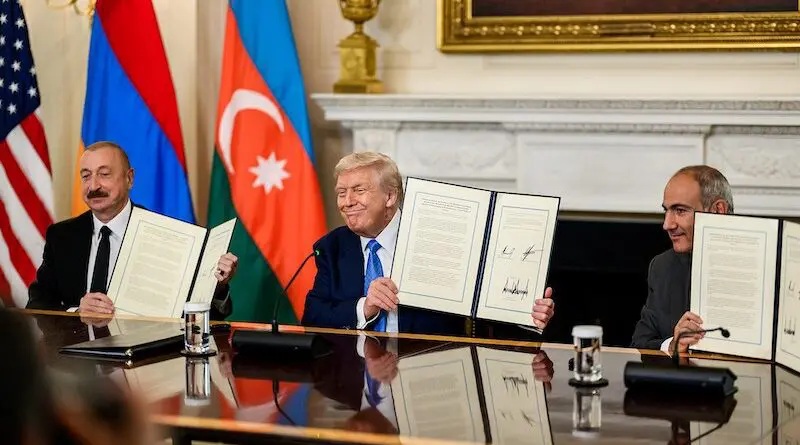
The Washington summit of August 2025, at which President Donald Trump hosted President Ilham Aliyev and Prime Minister Nikol Pashinyan, marked a decisive turn in the often-troubled trajectory of Azerbaijan–United States relations. Baku and Washington not only aligned their positions on peace in the South Caucasus; they also laid the groundwork for a strategic partnership extending beyond hydrocarbons into technology, connectivity, and regional stability.
By Robert M. Cutler
The summit’s significance lies not solely in its immediate outcomes but also in the promise of a reconfigured relationship. American firms already have a presence in Azerbaijan’s economy, and U.S. mediation has revived a measure of trust once thought lost.
There is now scope to broaden cooperation into digital innovation, trade, and infrastructure. These results indicate a renewed American engagement in a region where U.S. policy had long appeared hesitant, fragmented, or overly constrained by domestic political pressures.
Historical Background and Obstacles
Relations between Azerbaijan and the United States were forged in the immediate aftermath of the Soviet collapse. The “Contract of the Century”, signed in 1994, epitomised this convergence. By opening Azerbaijan’s Caspian reserves to an international consortium that included American oil majors, it not only unlocked energy resources but also positioned Azerbaijan as a dependable partner for Western markets.
Beyond energy, Azerbaijan demonstrated its reliability through practical contributions to U.S. security objectives. Following the attacks of 11 September 2001, Baku permitted the use of its territory for NATO and U.S. operations in Afghanistan. It dispatched a peacekeeping detachment, underlining its readiness to support international security despite unresolved conflicts on its own soil.
Yet cooperation was consistently constrained by Section 907 of the Freedom Support Act, adopted in 1992 under pressure from Armenian advocacy networks, which barred U.S. Government assistance to Azerbaijan.
From 2001 onwards, successive administrations in Washington waived Section 907 annually, enabling cooperation to deepen; nevertheless, the underlying asymmetry remained, considering how the U.S. treated Armenia. For many in Baku, American policy appeared selective and transactional: Azerbaijan’s support was welcomed when expedient, but its central grievances over occupation and displacement were disregarded. This perception of double standards corroded confidence in U.S. neutrality and foreshadowed later crises of trust.
From Biden’s Estrangement to Trump’s Reset
Under the Biden administration, American policy was increasingly shaped by domestic lobbying. Following the Second Karabakh War, Washington proved reluctant to acknowledge the implications of Azerbaijan’s restoration of territorial integrity.
Baku’s counter-terror operation of September 2023, which dismantled the separatist administration in Karabakh, was portrayed as aggressive rather than as the necessary conclusion of a protracted conflict.
At the same time, the Biden administration ceased issuing waivers to Section 907. Beyond halting established channels of assistance, the suspension carried symbolic weight. It signalled to Baku that its long-standing contributions to U.S. security and energy interests were no longer valued. For Azerbaijan, this reinforced perceptions of double standards and pushed relations to their lowest point since independence.
The change under Trump’s second term was immediate and conspicuous. The reinstatement of waivers in August 2025, effectively recognising Azerbaijan’s right to secure its sovereignty, reopened avenues for structured cooperation. Still more important, Trump assumed a personal role in mediation. The newly pragmatic American approach restored a degree of trust and prepared the ground for the breakthroughs that followed at the Washington summit.
The Washington Summit and Its Significance
The outcomes produced at the Washington summit mark a watershed for the region. The text of a peace treaty between Armenia and Azerbaijan, grounded in the five principles that Baku had set out three years earlier, was initialled. The agreement on mutual recognition of territorial integrity and the inviolability of borders effectively brought the decades-long conflict to an end. In addition, the two sides, with U.S. support, agreed to dissolve the defunct OSCE Minsk Group.
The summit also delivered a breakthrough in connectivity. Armenia, Azerbaijan and the United States agreed to establish the Trump Route for International Peace and Prosperity (TRIPP), a transport corridor linking mainland Azerbaijan to Nakhchivan through southern Armenia under American oversight.
For Azerbaijan, TRIPP secures physical integration with its exclave and strengthens the Middle Corridor that connects Europe with Asia. For Washington, it creates an instrument of influence in Eurasian transit at a time when the security of supply chains has become a strategic priority.
For Baku, the summit closed a turbulent historical period; for Washington, it offered the chance to re-establish credibility as a mediator after years of drift. President Trump’s personal involvement gave the process a momentum that institutional mechanisms such as the Minsk Group had lacked. By embedding peace in a framework of infrastructure and economic cooperation, the summit has opened the way to a reconfigured bilateral partnership.
Current Opportunities in Bilateral Cooperation
Energy remains the foundation for broadening U.S.–Azerbaijan relations into new and practical domains. The new agreement between SOCAR and ExxonMobil to expand exploration, production, and infrastructure consolidates Azerbaijan’s role as a reliable supplier to European markets. For Washington, this reinforces efforts to diversify European energy security; for Baku, it confirms the continuing relevance of hydrocarbons even as global markets evolve and its own national strategy aims to diversify its economy.
Beyond oil and gas, the non-energy economy offers considerable room for expansion. Beyond the hydrocarbon sector, American companies have invested in Azerbaijan’s construction, telecommunications, agriculture and services sectors, amongst others. Discussions at the summit highlighted opportunities to build on this base through projects in green technologies, industrial cooperation and logistics, supported by financial instruments from the U.S. Export–Import Bank.
Connectivity is another area of promise. The TRIPP corridor would be a critical artery for the Middle Corridor. By anchoring this route under American oversight, Washington acquires leverage over transit flows; for Azerbaijan, the corridor strengthens its status as a linchpin of Eurasian transit. Integrating TRIPP with broader regional infrastructure initiatives, from Central Asia to the Black Sea, suggests an impact extending far beyond bilateral relations.
Security cooperation rounds out the present agenda. Azerbaijan has demonstrated reliability in counterterrorism and peacekeeping. Washington can now deepen cooperation in maritime awareness, border management and hybrid-threat mitigation.
The simultaneous advancement of collaboration across the interrelated issue areas of energy, economy, infrastructure, and security will allow the two countries to generate mutually reinforcing gains, creating resilience for the partnership.
Digital and Strategic Innovation as Future Frontiers of Cooperation
The Washington summit signalled that the future of U.S.–Azerbaijan relations will not be confined to hydrocarbons. A most striking outcome was the agreement to embed cooperation in emerging technologies. The bilateral Memorandum of Understanding establishing a Strategic Working Group explicitly identified artificial intelligence, digital infrastructure and space technologies as priorities.
This dovetails with Azerbaijan’s newly adopted Artificial Intelligence Strategy for 2025–2028, which aims to build human capital, enhance competitiveness, and accelerate digitalisation across the economy. Large leading U.S. firms already operate in this domain, with scope for long-term partnerships. Structured cooperation could produce gains for Azerbaijan’s development and for American companies.
The digital sphere intersects naturally with questions of education and knowledge transfer. Exchange programmes, research initiatives and vocational training can reinforce Azerbaijan’s capabilities. Space and data-driven technologies add a further dimension. Azerbaijan has already demonstrated an interest in satellite communication and the commercial uses of space. The Strategic Working Group, tasked with preparing a Charter on Strategic Partnership, can ensure that these initiatives are embedded within a durable institutional framework.
Potential Political and Diplomatic Constraints
Despite the renewed momentum, several constraints could limit the trajectory of U.S.–Azerbaijan cooperation. Foremost among these are domestic political factors in Washington. Armenian advocacy networks continue to exert influence in Congress, and human rights debates will likely remain recurrent. Such pressures have historically shaped American policy towards the South Caucasus. Even with waivers to Section 907 reinstated, the possibility of legislative backsliding cannot be discounted.
Azerbaijan’s own foreign policy balancing also sets boundaries. Baku has long pursued a careful equilibrium among Turkey, Russia, Iran and the European Union; it has also recently deepened ties with China. Washington’s capacity to accept Azerbaijan’s multi-vector diplomacy will partly govern the durability of the cooperation.
A final constraint lies in the mutability of American foreign policy itself. Depending on the administration in office, Azerbaijan has experienced abrupt swings in Washington’s approach, eroding Baku’s confidence in the reliability of Washington’s engagement. The endurance of the renewed partnership will require evidence that agreements reached today are insulated, as far as possible, from partisan oscillation. The institutionalisation of cooperation through the Strategic Working Group can anchor commitments beyond any single administration.






